|
|
|
Sort Order |
|
|
|
Items / Page
|
|
|
|
|
|
|
| Srl | Item |
| 1 |
ID:
111228
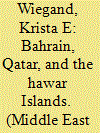

|
|
|
|
|
| Publication |
2012.
|
| Summary/Abstract |
The Hawar Islands dispute, resolved in 2001, is the only territorial dispute between two Arab states that has been resolved by the International Court of Justice (ICJ). Several factors played a role in influencing Qatar and Bahrain to resolve their dispute at the ICJ: 1) the inability of Arab states and the Gulf Cooperation Council (GCC) to mediate the dispute, 2) incentives for significant oil and natural gas reserves, and 3) incentives for bilateral and regional cooperation on salient issues between the two states. Both states have benefited significantly since the resolution of the dispute.
|
|
|
|
|
|
|
|
|
|
|
|
|
|
|
|
| 2 |
ID:
089066


|
|
|
|
|
| Publication |
2009.
|
| Summary/Abstract |
For almost four decades, China has disputed Japan's sovereignty of several small rocky islands in the East China Sea. Despite a June 2008 joint gas development agreement, China continues to claim sovereignty and the dispute is nowhere close to being resolved. This study proposes that China benefits from the endurance of the dispute because it can use territorial dispute threats to compel Japan to change its behavior or policy on other disputed issues. The results show that China gained concessions on other issues by using the territorial dispute as bargaining leverage in most of the 26 threats made between 1978 and 2008.
|
|
|
|
|
|
|
|
|
|
|
|
|
|
|
|
| 3 |
ID:
096362
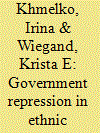

|
|
|
| 4 |
ID:
133154
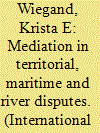

|
|
|
|
|
| Publication |
2014.
|
| Summary/Abstract |
This article seeks to explain factors that make mediation attempts more or less likely in territorial, maritime, and river disputes. I argue that the intensity of the dispute and the salience of disputed territory have strong influence on mediation attempts. The study further examines the impact of these factors on the type of mediation strategy (directive, procedural, or communications). Hypotheses about mediation attempts are tested with the icow data set of interstate territorial, maritime, and river disputes from 1816 to 2001. Findings indicate that intensity of the dispute and salience of disputed territory have a strong impact on the selection of mediation in the first place, and second, that salience of disputed territory makes the directive strategy more likely, while intensity of the dispute makes procedural or communications strategies more likely.
|
|
|
|
|
|
|
|
|
|
|
|
|
|
|
|
| 5 |
ID:
102512
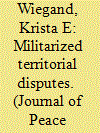

|
|
|
|
|
| Publication |
2011.
|
| Summary/Abstract |
States involved in territorial disputes are more likely initiate militarized interstate disputes to threaten or use force (MIDs) compared to states involved in other types of interstate disputes, when the disputed territory has strategic or ethnic value, and when the opposing states are contiguous, rivals, or have relative power parity. Though useful, these factors are static or rarely change over time, so they cannot explain the timing of an MID in a territorial dispute. It is not clear why a challenger state would threaten or use force at one point in the dispute, but not at another point. This study proposes that challenger states sometimes use MIDs not only to signal resolve to the opposing state in the territorial dispute, but to credibly demonstrate resolve to other adversaries in other disputes - an attempt to transfer reputation for resolve. To tackle the debate about transferability of reputation for resolve, the study empirically analyzes all territorial disputes from 1919 to 1995 and finds support that challenger states are more likely to initiate territorial MIDs as costly signals of resolve and credibility around the same time as another MID with a different adversary. Further analysis indicates that in terms of intensity level, challenger states are more likely to use threats, displays of force, or low intensity uses of force when initiating an MID to signal resolve to other states.
|
|
|
|
|
|
|
|
|
|
|
|
|
|
|
|
| 6 |
ID:
066378


|
|
|
| 7 |
ID:
101856


|
|
|
|
|
| Publication |
2011.
|
| Summary/Abstract |
Does a state's past win/loss record affect its subsequent choices of peaceful dispute resolution methods in territorial disputes? We present a theory that portrays attempts at peaceful resolution as a strategic process, by which states search for the most favorable forum. During the process of decision making, a state strategically chooses between several methods of peaceful resolution; its final choice is based on the state's past experience with this particular method. Empirical analysis of all attempts at peaceful resolution of territorial disputes from 1945 to 2003 shows that challenger states use their own record of victories and failures, as well as the win/ loss record of the target as indicators of the probability of winning in a subsequent dispute. This pattern is especially strong for the binding third-party methods, arbitration, and adjudication.
|
|
|
|
|
|
|
|
|
|
|
|
|
|
|
|
| 8 |
ID:
167877
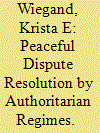

|
|
|
|
|
| Summary/Abstract |
What explains the attempts of different regime types, particularly different types of authoritarian regimes, to resolve international disputes peacefully, especially through legally binding methods? This study argues that the institutional structure of different types of authoritarian regimes—mainly the size of the winning coalition—influences the probability of resolution attempts. Regimes that have larger winning coalitions are more likely to seek peaceful dispute resolution because they can provide public goods that result from territorial concessions in dispute settlement. Likewise, regimes that are better able to promise public goods are expected to be more likely to do so through institutionalized, binding means in order to avoid domestic punishment. Analyzing two different datasets of authoritarian regime types, combined with data on territorial disputes from 1946–2007, the study finds that single-party regimes are generally more likely than other types of authoritarian regimes to pursue peaceful dispute resolution, specifically legally binding resolution methods.
|
|
|
|
|
|
|
|
|
|
|
|
|
|
|
|
| 9 |
ID:
178687


|
|
|
|
|
| Summary/Abstract |
This article introduces the Peaceful Resolution of Territorial Disputes (PRTD) dataset, covering all interstate territorial disputes (1945–2015). Our dataset captures proposals for the peaceful resolution of territorial disputes made by states involved in territorial claims at the disputant-year level. These proposals provide a concrete measure of changing state preferences toward negotiations, non-binding, and binding third-party dispute resolution methods over time. In contrast to existing attempt-level data, the monadic panel design of the dataset captures not only actual attempts at peaceful resolution – the result of an agreement between disputants – but also proposals for methods that did not occur but were preferred at a particular time point. Our dataset allows for robust and generalizable quantitative analyses of the peaceful resolution of territorial disputes that are sensitive to temporal, regional, claim-based, and state-level trends. To demonstrate the utility of our dataset, we use hybrid logistic regression to examine the determinants of binding PRTD proposals. Over-time changes in characteristics such as regime type and treaty commitments influence attitudes toward binding settlement methods differently than disputant-level measurements. We also show that time has a distinctively non-linear effect.
|
|
|
|
|
|
|
|
|
|
|
|
|
|
|
|
| 10 |
ID:
090319
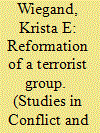

|
|
|
|
|
| Publication |
2009.
|
| Summary/Abstract |
Despite the classification of Hezbollah as a terrorist group by several states, Hezbollah is recognized as a legitimate political party within Lebanon. The purpose of this article is to probe at the reasons why Hezbollah was able to achieve its current status in the Lebanese government while it still maintains a powerful, well armed military branch that has used force recently to influence Lebanese politics. An examination of Hezbollah's life cycle suggests that two major factors were decisive: 1) Hezbollah's political leverage over the majority government, and 2) choices by Hezbollah's leaders to moderate their objectives to achieve domestic political goals.
|
|
|
|
|
|
|
|
|
|
|
|
|
|
|
|
| 11 |
ID:
132351


|
|
|
|
|
| Publication |
2014.
|
| Summary/Abstract |
States involved in territorial disputes have several options with regard to resolving their disputes. What types of states are more likely to resort to legal methods of peaceful resolution in attempting to resolve their territorial disputes? We posit that two separate mechanisms affect states' decisions to choose legal methods of peaceful resolution: the legal mechanism - domestic rule-of-law, and the political mechanism - win/loss record. Rule-of-law based arguments cannot fully explain states' behavior towards arbitration and adjudication. It is the interplay of both of these mechanisms that explains the strategic choices made by states with regards to arbitration and adjudication. We explain why some high rule-of-law states return to binding methods, while others turn to different forums, and why low rule-of-law states consider binding methods. Empirical analyses of all attempts at peaceful resolution of territorial disputes from 1985 to 2006 show that high rule-of-law states are more likely to return to international binding venues only if they have a positive experience with these methods. On the other hand, we find that low rule-of-law states are not concerned with their record of successes/failures when resorting to international binding venues. Overall, the effect of regime type/rule-of-law is conditioned by past successes and failures in international resolution venues.
|
|
|
|
|
|
|
|
|
|
|
|
|
|
|
|
| 12 |
ID:
173692


|
|
|
|
|
| Summary/Abstract |
East Asian states infrequently seek peaceful dispute resolution through binding methods of international law. What is puzzling is why states seek one particular dispute resolution method or another, and in the specific case of the Philippines, why the government chose to pursue arbitration against China regarding the maritime boundaries of the disputed Spratly Islands, knowing that China would not agree to participate. In this article, we theorize that the Philippine government chose to pursue arbitration against China for three strategic reasons: 1) to counterbalance China’s military actions in the South China Sea, 2) because of the strong benefits to the state resulting from using arbitration, and 3) the probability of winning the case using arbitration was perceived by the Philippines as strong. To test our hypotheses, we use interviews and process tracing, through which we find evidence for our suppositions, primarily the last hypothesis.
|
|
|
|
|
|
|
|
|
|
|
|
|
|
|
|
|
|
|
|
|